2022 Week 5: Neighborhood/Community organizing
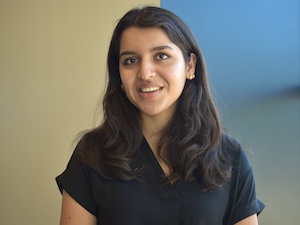 Aiman Altaf | 29th St Community Center
Aiman Altaf | 29th St Community Center
This week, I attended the first event of our summer connect series, where I set up a wellness table. It was incredibly validating to see how excited people were about learning more, and being at the table also gave me an excuse to talk to way more people than I would have at this event otherwise. A 70-year-old woman walked up and told me about how she was taking care of herself and her body (She didn’t look a day over 50 to me!), there was a couple that told me about how they had recently become vegetarian and their wellness goal was “to be happy”, which really put the whole goal of the table into perspective. A 10-year-old girl was the DJ at the event and she was mixing music better than most professional DJs I had seen. I also spoke to a teacher at the VLP who wanted to collaborate with me on the nutrition lessons I’m doing with the kindergartners at summer camp. People seemed to really enjoy telling me their health journeys, writing down their health goals, and were really excited about the take-home recipes and fitness resources I had printed out. And I’m writing all these examples here mostly so I can look back later and remember all the different people I had the chance to meet because of this one table, but also just to show that this is what bringing community together looks like, and it was incredibly gratifying and rewarding to see that.
Growing up moving around a lot, I have never felt a strong sense of home or community, and the biggest thing I’ll take away this summer is that feeling. Working at a community center, whose mission is literally to bring together community, I have rediscovered how important it is for me to interact with people, to hear their stories, and just to have a space space of my own that feels like home. It has really brought me back to one of the core purposes of my life, which is to build meaningful connections with people. And I’ve been able to do that through such events, the summer camp, and the classes we are running (we had our first Art with a Heart workshop this week, which was pretty well attended and we did a fiber art lesson. I sat across from one of the attendees and we just chatted the entire hour while making our artwork). We also had our first music production class, which was led by The Boredom Fighters, and I got to hear some really cool beats they had made just independently because they love music so much.
In terms of how this internship will serve my career, I was a bit worried that it wouldn’t serve my career goals and thus would feel like “wasted time” at the end just because it wasn’t inherently pre-med. However, at a certain point I chose to discard that mentality and just to bring my interests to the position but also to let the position influence me, and just to see where the internship led. Now, being past the midpoint, it’s clear that the skills I’ve picked up like patience, communication, compassion, empathy, etc, are incredibly valuable in any profession I will choose to pursue.
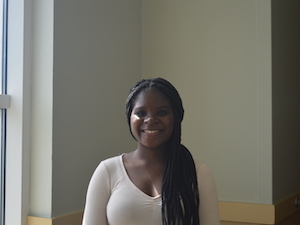 Mimi Avril | Central Baltimore Partnership
Mimi Avril | Central Baltimore Partnership
Throughout my internship I have learned multiple practical skills and have been challenged in numerous ways, however, the most important thing I have learned so far is to let my personal moral beliefs form my foundation and guide me as I navigate different areas of work. Through my partner organization’s public health and wellness initiatives in the Baltimore neighborhoods, I have gotten to explore real life practical public health policy and initiative examples as they impact communities. While I initially started my internship with a hard focus on settling on clinical psychology as an area of work, I have realized that so many of my personal beliefs and moral values as a young woman from a low-income background, an immigrant, a socialist, and prison abolitionist, are grounded in the tenants of public health. I have discovered many aspects of public health I didn’t know about before such as corner store advocacy for fresh produce in urban neighborhood and food stamp acceptance, designing trauma informed neighborhoods, and the creation and maintenance of open spaces as a harm reduction effort. To me, these initiatives are rooted in humanity and the dedication to the fulfillment of lives lived in their full dignity and capacity. I’m starting to see that if I am grounded in my beliefs, I will land where I am be able to contribute meaningfully to the communities I apart of and to honor my passions.
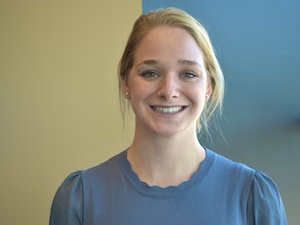 Kate Overbey | Greenmount East Leadership Project
Kate Overbey | Greenmount East Leadership Project
A huge aspect of my work this summer is communication. There is a significant cultural and racial divide between myself and the youth I work with, meaning I have to find ways to connect beyond your separate backgrounds. Many of my youth have grown up in single-parent households, in poverty, homeless, and/or experienced gun violence at a young age. Understanding where they are coming from is a huge part of connecting with them to help better give them the resources, they need to break the cycles of violence and poverty they have grown up with.
After graduating from college, I intend to go to medical school and pursue a career in medicine. Throughout my time as a doctor, I will interact with and treat patients from a wide variety of backgrounds, and to establish trust between myself and my patient, I have to be able to empathize with and understand the circumstances that a patient is coming from.
The communication skills I have learned in this internship will allow me to communicate diagnoses and treatment plans more effectively to my patients. Effective patient-physician communication has been shown to significantly improve patient outcomes and compliance with treatment plans. Understanding socioeconomic and cultural factors associated with health, combined with the ability to communicate that information to the general public is key to being a successful doctor.
Throughout my time at Greenmount East Leadership Program, I have been exposed to and connected with my youth in various ways and established clear, open communication and trust with both them and the Greenmount community. The skills I’ve learned in establishing that relationship and the exposure to different communities will follow me through my career as a doctor and ultimately make me better equipped to serve my community.
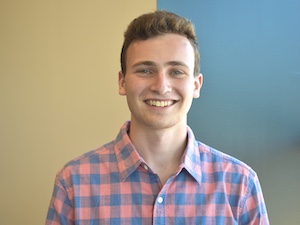 Will Polen | Neighborhood Design Center
Will Polen | Neighborhood Design Center
I met the mayor this week! We were at a groundbreaking event, and once he spoke, I knew I had to get a photo with him. After a quick flick and a discussion about the Orioles’ 10 game win streak, I was starstruck. This guy — who knows Baltimore so well, who grew up in its public schools — is a rare man of the people. Usually politicians are random people who put on a suit and play the game (or at least that’s what the cynic in me says) but Mayor Scott deeply cares about the city. There was no photo-op, no huge crowd, yet Mayor Scott still came to the event and gave it 110%. He saw something he believed in, and wanted to partake.
That authenticity and intrinsic desire to do good is what propelled me through the rest of the week. As projects progress on Arch Social Club and a Pennsylvania Avenue welcome center, I find myself putting in the extra effort aid them. I can see their visions unfolding more clearly, I can understand the tangible benefits they’ll have on Baltimoreans, and I truly believe it should be all-hands-on-deck to make these places a reality.
Hopefully I get another few photos with Mayor Scott when these projects are completed too!
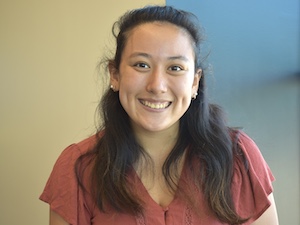 Cecilia Ramirez | Historic East Baltimore Community Action Coalition
Cecilia Ramirez | Historic East Baltimore Community Action Coalition
Week 5!
Coming in to this week, I did not expect to get sick but so life happens, we had to roll with the punches. I think an important lesson I learned from this week was the importance of setting boundaries, clear communication, and speaking up for myself. I think in the academic year, it is so normal to push through sickness until it literally puts you out or your assignments are finished. Don’t get me wrong, I was very sick, but this time I acted proactively enough to deal with the situation before it ended up being this huge catastrophe. Really it was for the betterment of myself and everyone who works at my placement, but still was a slight learning curve realizing I had to communicate my needs and respect that. Thankfully, my supervisor was super understanding and accommodating, even checking in each morning and being flexible between working in person and virtually.
That brings me to the second realization. I am so in awe and grateful to live in this age where so much can be done virtually. The world of technology really connects us more than ever before, and allowed me to work when I personally was feeling fine without potentially exposing anyone.
Though not strictly based on my experiences at my internship but rather professional life in general, I feel like these 2 reflections are relevant for everything I do from now, even bringing these lessons into my academic life. Though not an ideal week, still one of value!
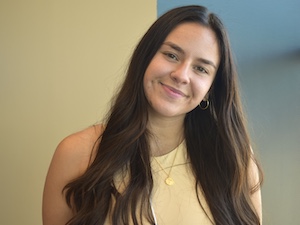 Laís Santoro | Pro Bono Resource Center
Laís Santoro | Pro Bono Resource Center
This past week was probably my favorite week so far- and definitely the one I have learned the most about- because I finally went in person!! I went to court for immigration, and saw court in session. My client was Brazilian, hence why we coordinated that we would both go on the same day so I could interpret in Portuguese. It was a smaller/ shorter clinic day in person, but I was able to check out a court session with an immigration judge with the attorney that I was interpreting for. The court building was also quite fancy and I toured around, saw the ICE check-in room in the basement of all places and just felt the weight and environment of a place that is holding a lot of important decisions for people’s lives. People really want better opportunities and safety, and hope to find that here. It is just frustrating with our immigration law, that you have to prove to yourself that you are worthy of staying, that you have to prove your trauma was traumatic enough and your situation is bad enough wherever you come from, in order for them to see you as a person worthy of having documentation status in this country. It is really messed up, but even just listening to the clients share their stories matters and makes a difference so hopefully they can stay as long as possible and find the most help they can.
I also attended an application assistance day event at the PBRC office, where I spoke to a few clients and met the staff in person that I had been speaking to just online. It was similar to a clinic but not quite and I got to speak to some clients while they were waiting to speak to the attorneys. It ended early, so after, my supervisor and some other staff, the director of the Home Preservation Project and client manager for the same project, as well as myself went and got some food at this restaurant across the street, just chatted about non-work topics and got to learn more about each other. It was so fun, and I felt like an adult and not a college student, getting along with her co-workers after a day at work. I’m learning how to get used to this lifestyle and maybe not have a fixed 9-5 but something where I am learning everyday and doing something new and worthwhile.
The last day of the week was also a very new experience for me. I was with the immigration project again and we went to an elementary school to serve mainly unaccompanied minors and families that go to the school. I thought I was going to interpret, but many interpreters showed up and I got a new job as a facilitator. As people walked in, they needed to complete a registration form that is in Spanish but can sometimes but a bit unclear, so we would check on them and ask if they had any questions, if they needed anything, that sort of thing. Also, all their children came with them, so we had to set up a kid’s table that they could color, get a sticker or play with bubbles while they were waiting for their parents. It was a bit tough to keep control of them but they were all so sweet and I was having a blast coloring with crayons and seeing them smile. With non-profit work, you really don’t know what to expect and need to know where to fill in the gaps about what people need. For me, that was caring for the kids and alleviating some stress from the parents while they went to go talk to the attorneys about some potentially really difficult things. I was expecting to interpret but facilitating like that was new for me and I think I helped where I could. I was also reminded that kids know certain things about the world and have really strong senses about what is going on. One mother came with her daughter and were just coloring together. She went to speak to an attorney for the consult, and apparently the little girl heard the word “lawyer” and got so stressed out and started crying because she was scared. The attorney came and asked me to hang out with her and we colored her house, I learned all about her favorite foods, her family, and tried to let her be a child rather than feel super concerned about her mother’s immigration case. Being right next to the mother, I understand why she was stressed and potentially didn’t trust the lawyers, and also given the history of abuse that made the child eligible for Special Immigrant Juvenile Status and the mom likely to be granted asylum. It was heartbreaking, but the mom and child left the consult together smiling and hopefully a little more hopeful about their situation. I was just grateful to learn about what it can be like for these families and support however I can.
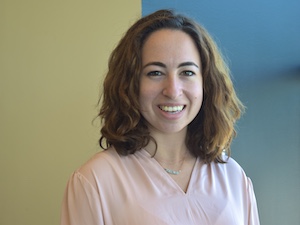 Lily Sheth | Neighborhood Housing Services of Baltimore
Lily Sheth | Neighborhood Housing Services of Baltimore
The most valuable lesson that I have learned this summer is that “people are the experts in their own experience.” I was introduced to this motto during orientation, as I learned about my privilege and place as a Hopkins student in the city of Baltimore. Both guest speakers affiliated and unaffiliated with Hopkins instilled in our cohort that when it comes to social justice issues in this city, we are not the experts. We were encouraged to listen to the residents of Baltimore as they are the ones with lived experiences of the massive social inequalities that persist in this city. Reading journal articles and participating in professor led discussions about residential discrimination, food insecurity, and mass incarceration may help me better understand the struggles of others, but that is no substitute for people’s experiences in disinvested areas.
I am grateful to the speakers from orientation for advising the cohort to truly, actively listen to the experiences of the community we are partnering with this summer. Through attending community events, helping seniors fill out home repair applications, hosting open houses, and talking to the residents of West Baltimore on their porches, I have learned more about social justice issues in 5 weeks than in 2 years in the classroom. I also see how my coworkers at NHS prioritize the voices of the community that they are serving and internalize and apply resident concerns and desires to the work that they are doing.
I will take the lesson “people are the experts in their own experience” into my chosen future career as an urban planner. Too often, urban planners ignore the requests and situations of the populations they are serving and displace individuals further, exacerbating historical discrimination and segregation. Unfortunately, it is common for city planners to listen to those in power: CEOs, political actors, and wealthy citizens– the minority. In whichever city I end up in, I strive to elevate the voices and experiences of the people that are directly impacted by the choices that I will make and in that process create urban environments that are safer, more equitable, and begin to repair longstanding disinvestment in underserved neighborhoods.
